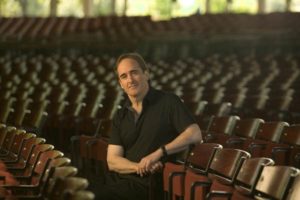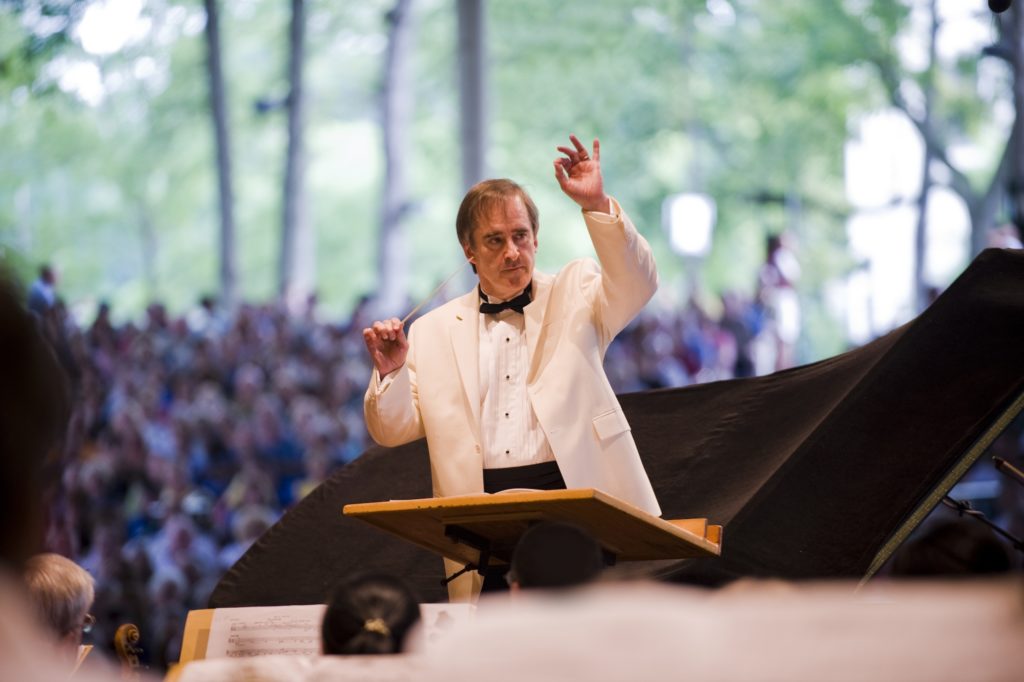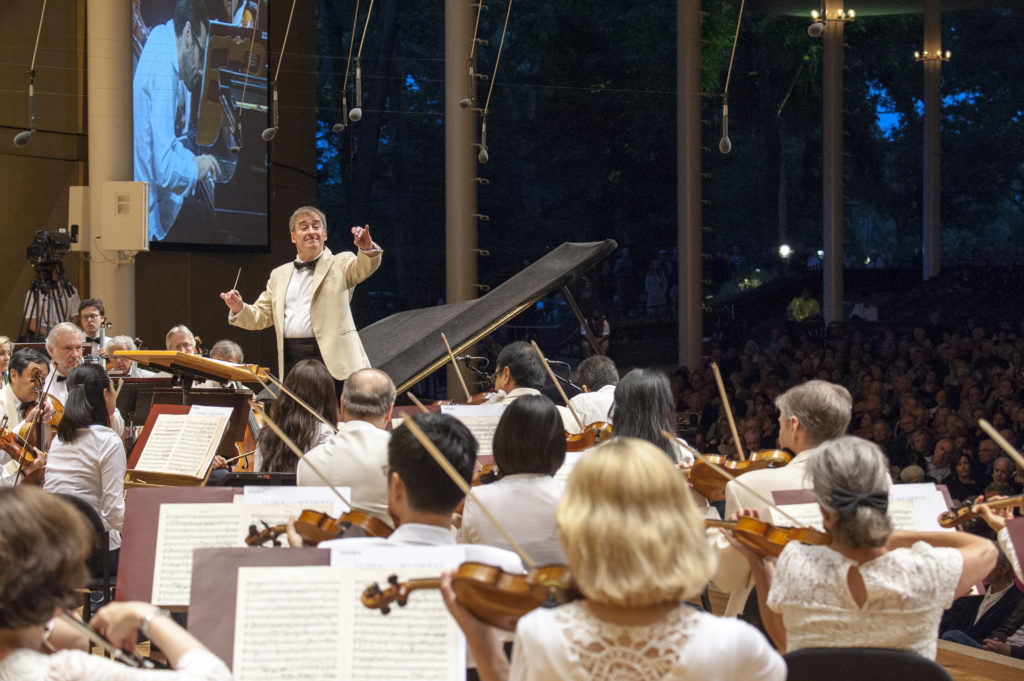“I’m certainly not retiring,” said James Conlon, as he chatted by phone from Italy, where he had just spent an intense couple of weeks commuting daily between Rome (where he conducted Tchaikovsky’s opera, “The Queen of Spades”) and the beautiful Italian hill town of Spoleto (where he conducted Mozart’s “Cosi fan tutti” at part of its annual festival).
Yet after he leads the Chicago Symphony Orchestra in five major concerts at the Ravinia Festival’s 3500-seat outdoor Pavilion this summer, Conlon will be stepping down as its music director — a post he has held for 11 seasons, following in the footsteps of Seiji Ozawa, James Levine and Christoph Eschenbach.
That still leaves him with a formidable workload — serving as music director at both the Los Angeles Opera and the Cincinnati May Festival, and maintaining a busy schedule of national and international conducting engagements, including “downtown dates” with the CSO (a program of Dvorak and Mozart on Dec. 17 and 18).
“Everything has its time, and after 11 years I feel it is the moment to pass on this responsibility,” Conlon said earlier this year. “I have worked year-round, including every summer, since 1974. There are things I wish to accomplish, both musical and personal, and I need dedicated time to realize these projects.”
But for now his focus is on a formidable farewell season at Ravinia.
“Each of the five programs I’ll be conducting will reflect something I think was of significance during my years there,” said Conlon.
“The Mahler cycle was central to my work, so we’ll start off with Mahler’s ‘Symphony No. 1.’ And I’ve done more Mozart at Ravinia than any other conductor, including on the very first program I ever led there, back in 1977, so it’s only natural to have Garrick Ohlsson perform Mozart’s ‘Piano Concerto No. 23′.”
“Over the years I’ve also done many of the Shostakovich symphonies, so his ‘Fifth Symphony’ will be part of an all-Russian evening, and playing Rachmaninoff’s ‘Piano Concerto No. 1′ will be the wonderful French pianist, Lise de la Salle, who represents my work at Ravinia’s Steans Music Institute [the summer conservatory for gifted young musicians from around the globe].”
During his tenure at Ravinia, Conlon also conducted most of Tchaikovsky’s symphonies, and he confessed: “The older I get [Conlon is now 65], the more I have grown to love Tchaikovsky. Conducting his ‘Queen of Spades’ at the Rome Opera this summer was a rare event — the first time since 1956 that it was done there. And I have made the Aug. 1 gala at Ravinia an all-Tchaikovsky program, with Maxim Vengerov, a musician I greatly value, playing the Russian composer’s ‘Violin Concerto in D Major.’ In addition, if there is one thing I had hoped to do at Ravinia but never managed to get to, it was conducting the complete scores of Tchaikovsky’s ‘Swan Lake,’ so also on that gala program we will play excerpts from the ballet.”
For another program, Conlon has paired Brahm’s “Piano Concerto No. 1″ (featuring the Mexican-born, Highland Park-based pianist Jorge Federico Osorio), with Alexander Zemlinksy’s “Die Seejungfrau” (“The Mermaid”), a symphonic fantasy inspired by the Hans Christian Andersen story. Zemlinsky, who fled Vienna and settled in the U.S. in 1938, is one of a number of composers Conlon has championed as part of his project, “Recovered Voices,” which has brought to light the work of those silenced by the Nazis either through exile or death.
And then there is the grand finale: A concert performance of “The Flying Dutchman,” the only opera of Richard Wagner “that is not too long.”
“I once heard Maestro Solti conduct this work at Carnegie Hall, and it has always remained in my mind as something I wanted to do,” said Conlon.
As for working with the CSO, Conlon said: “I know the orchestra so well, and it works on such a fantastic level. The technique is incredible, as is the speed and flexibility with which they all work, and there is just a built-in energy and electricity about their playing.”
One major change at Ravinia during the past decade has been the ever-increasing programming of rock and pop concerts.
“That’s not just at Ravinia,” said Conlon. “And it’s one of the big challenges to those who believe in classical music, and are determined to fight for its continuance. The music will never die; Beethoven’s symphonies are here forever. But the institutions that support it are now faced with finding ways to turn the trend around. I believe the loss of music education programs in the schools in recent decades is a serious problem. I grew up in New York City’s public schools, where such programs were the norm, and my time at the High School of Music and Art was invaluable. I just wish there were thousands of such schools.”
There is no word yet about who will succeed Conlon at Ravinia. And as tradition holds, he will not be involved in the selection process or any decision-making for the next music director.
Here is the lineup of Conlon’s five concerts with the Chicago Symphony Orchestra at Ravinia:
— July 22 at 8 p.m.: Mozart’s “Piano Concerto No. 23 in A Major”; Mahler’s “Symphony No. 1 in D Major.”
— July 23 at 8 p.m.: All-Russian Evening, with works by Mussorgsky (selections from “Khovanshchina”), Rachmaninoff (“Piano Concerto No. 1 in F-sharp Minor, Op. 1″) and Shostakovich (“Symphony No. 5 in D Minor, Op. 47″).
— July 29 at 8 p.m.: Brahms’ “Piano Concerto No. 1″ and Zemlinksy’s “Die Seejungfrau.”
— Aug. 1 at 7 p.m.: All Tchaikovsky Gala including selections from “Swan Lake,” “Violin Concerto in D Major, Op. 35,” and the “1812” Festival Overture, Op. 49.
— Aug. 15 at 7:30 p.m.: Wagner’s “The Flying Dutchman” in concert.


